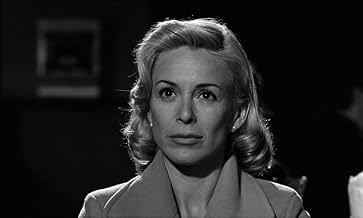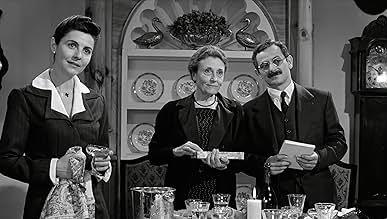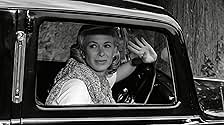Ajouter une intrigue dans votre langueSpain, late 1940s. Julia leaves Madrid after falling into a deep depression when his lover, José Miguel, a prominent painter and opponent of the Fascist regime, is incarcerated.Spain, late 1940s. Julia leaves Madrid after falling into a deep depression when his lover, José Miguel, a prominent painter and opponent of the Fascist regime, is incarcerated.Spain, late 1940s. Julia leaves Madrid after falling into a deep depression when his lover, José Miguel, a prominent painter and opponent of the Fascist regime, is incarcerated.
- Réalisation
- Scénario
- Casting principal
- Récompenses
- 15 victoires et 22 nominations au total
Avis à la une
Whereas the use of black and white in modern films may well be considered appropriate perhaps nowhere better explored to great effect in Spielberg's `Schindler's List' one cannot help thinking that resorting to this vehicle of expression should be for photographic reasons, not in an attempt to kindle preterite ambientation. Therefore the filmed interiors in `You're the One' are reasonably acceptable, but the exteriors should have been in colour. If only for the reason that the Principality of Asturias, on the Cantabrian coastline in the north of Spain, has some of the most beautiful scenery you are ever likely to see. Asturias majestically sweeps from peaks of over 2,000 metres down to the sea, fragmented by the most beautiful river valleys in deep gorges.
Apart from that little quibble, suffice to say that with `You're the One' Garci is bent on continuing his overly sensibilised incursions into yesteryear, taking great pains over the details of each scene, in order to produce a story which is supposed to awaken a rather varied range of feelings in the viewer. It depends on how old the viewer is and where the viewer lives .. If the viewer is too young or not Spanish, he may well rush out and get a DVD of `The Lord of The Rings' or the latest blockbuster from Seagal, Willis, van Damme and the like. However, a viewer of my age the same as Garci who has any recollections whether favourable or not of the social conditions reigning in Spain in those bygone decades, the reaction is likely to be something like: yes, very nice, but
It is this `but' which worries me. Ever since `Volver a Empezar' through `La Herida Luminosa' (qv) up to that little masterpiece `El Abuelo' (qv), Garci has used his commendable skill to great effect, evoking real human stories to wonderful effect. This is plainly manifested also in `You're the One', with some really magnificent interpretations, especially by Lydia Bosch and Iñaki Miramón (tut, tut, smoking in a classroom of children .); of course both Julia Gutiérrez Caba and Fernando Guillén are excellent lending `nobility' to the proceedings; we must not overlook the always natural appearance of Manuel Lozano, here as elsewhere in his filmography most notably in his first film `La Lengua de las Mariposas' (qv). Juan Diego plays an excellent part, later overshadowed by his part in the heroic TV mini `Padre Coraje' (qv).
But .. Could not Garci in his reminiscences come a little closer to the modern day? Could he not put on the screen stories of more recent times, instead of delving back into the murky mists of the past? Possibly not: Garci himself is so deeply immersed in the Hollywood of the 1940s and 1950s which he admires so greatly, seemingly he is not disposed to coming out but very much intent on keeping alive that time-worn spirit of `Casablanca' and `Gone With the Wind' et. al. Cinema which, for me, is so outdated and so awkwardly plastic, that I cannot sympathise with Garci's predeliction: it all seems so much from another planet.
The photography is very good. The music has good moments, but frequently wanders off into almost plagiaristic fragments so mindfully aware of Antón García Abril.
Apart from that little quibble, suffice to say that with `You're the One' Garci is bent on continuing his overly sensibilised incursions into yesteryear, taking great pains over the details of each scene, in order to produce a story which is supposed to awaken a rather varied range of feelings in the viewer. It depends on how old the viewer is and where the viewer lives .. If the viewer is too young or not Spanish, he may well rush out and get a DVD of `The Lord of The Rings' or the latest blockbuster from Seagal, Willis, van Damme and the like. However, a viewer of my age the same as Garci who has any recollections whether favourable or not of the social conditions reigning in Spain in those bygone decades, the reaction is likely to be something like: yes, very nice, but
It is this `but' which worries me. Ever since `Volver a Empezar' through `La Herida Luminosa' (qv) up to that little masterpiece `El Abuelo' (qv), Garci has used his commendable skill to great effect, evoking real human stories to wonderful effect. This is plainly manifested also in `You're the One', with some really magnificent interpretations, especially by Lydia Bosch and Iñaki Miramón (tut, tut, smoking in a classroom of children .); of course both Julia Gutiérrez Caba and Fernando Guillén are excellent lending `nobility' to the proceedings; we must not overlook the always natural appearance of Manuel Lozano, here as elsewhere in his filmography most notably in his first film `La Lengua de las Mariposas' (qv). Juan Diego plays an excellent part, later overshadowed by his part in the heroic TV mini `Padre Coraje' (qv).
But .. Could not Garci in his reminiscences come a little closer to the modern day? Could he not put on the screen stories of more recent times, instead of delving back into the murky mists of the past? Possibly not: Garci himself is so deeply immersed in the Hollywood of the 1940s and 1950s which he admires so greatly, seemingly he is not disposed to coming out but very much intent on keeping alive that time-worn spirit of `Casablanca' and `Gone With the Wind' et. al. Cinema which, for me, is so outdated and so awkwardly plastic, that I cannot sympathise with Garci's predeliction: it all seems so much from another planet.
The photography is very good. The music has good moments, but frequently wanders off into almost plagiaristic fragments so mindfully aware of Antón García Abril.
I saw this film at the Portland international festival and I loved it (others did too -- it was selected for the final day's encore screenings). Very touching with wonderful performances, and it looks amazing. It was shot in black and white, and the exteriors in the Spanish countryside are gorgeous. The cinematographer won a Silver Bear for individual achievement at Berlin for his work on this film.
When I first saw this movie I thought It was really the perfect movie. I liked every thing of it, and in fact, it is still one of my favourites movies. Not only cinematography or music, but also actors and almost everything is wonderful. Somepeople may thing this is a boring picture, but I think it's been made with a lot of sensibility and madurity. In my opinion, watching "You're the one" is like looking at a nice picture of a good painter such as Velázquez, Goya or Van Gohg.
I saw this film in the Berlin film festival world premiere. I was deeply touched by the beauty of the Cinematography. The story can be really melodramatic, but because of the Cinematography and the fine performance of the actors, this film is for sure a breathtaking film.
A movie in black and white about a very simple story, about the sadness of losing a person you love with that kind of love that should be forbidden. A movie about movies, about impossible love, about fanatism, about life. A story from those times, "una historia de entonces", with a talented director at his best. Another kind of cinema, the kind of cinema only a few chosen people can do.
Le saviez-vous
- Citations
Don Matias: My God, why haven't you forsaken me?
- ConnexionsFeatures Gunga Din (1939)
Meilleurs choix
Connectez-vous pour évaluer et suivre la liste de favoris afin de recevoir des recommandations personnalisées
Détails
- Date de sortie
- Pays d’origine
- Site officiel
- Langue
- Aussi connu sous le nom de
- You're the One
- Lieux de tournage
- Sociétés de production
- Voir plus de crédits d'entreprise sur IMDbPro
- Durée1 heure 51 minutes
- Couleur
- Mixage
- Rapport de forme
- 2.35 : 1
Contribuer à cette page
Suggérer une modification ou ajouter du contenu manquant

Lacune principale
By what name was You're the one (una historia de entonces) (2000) officially released in Canada in English?
Répondre



























